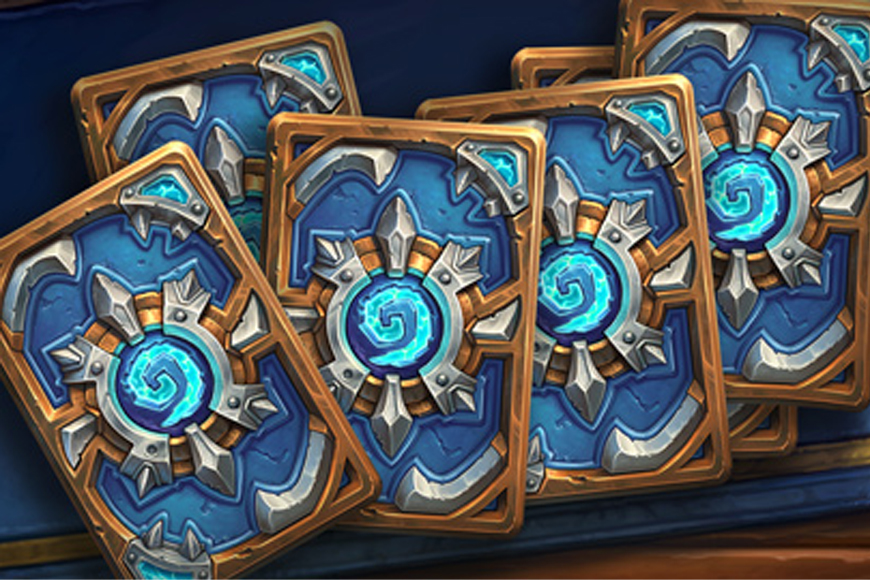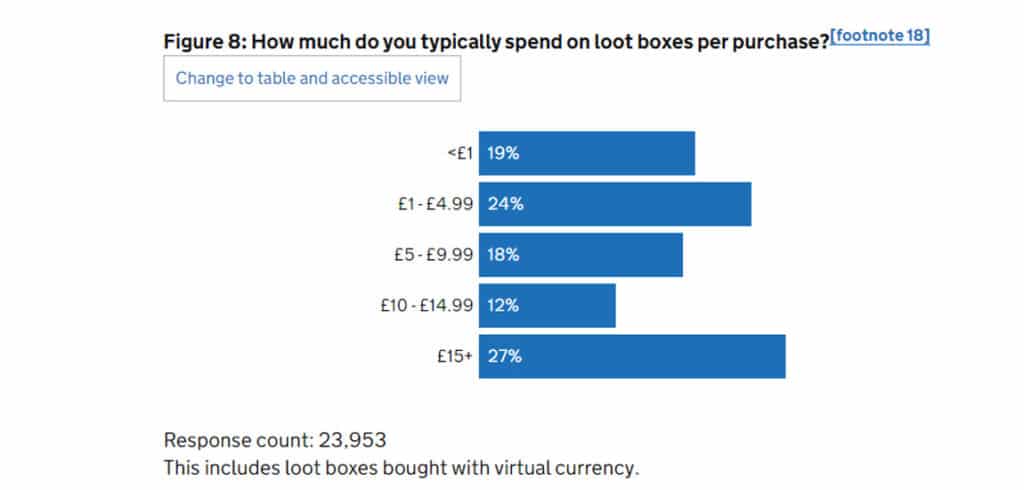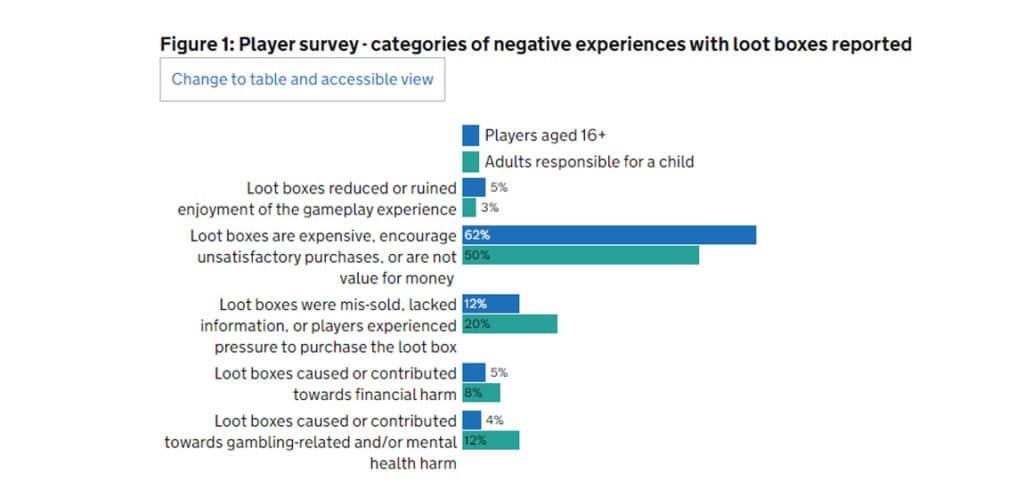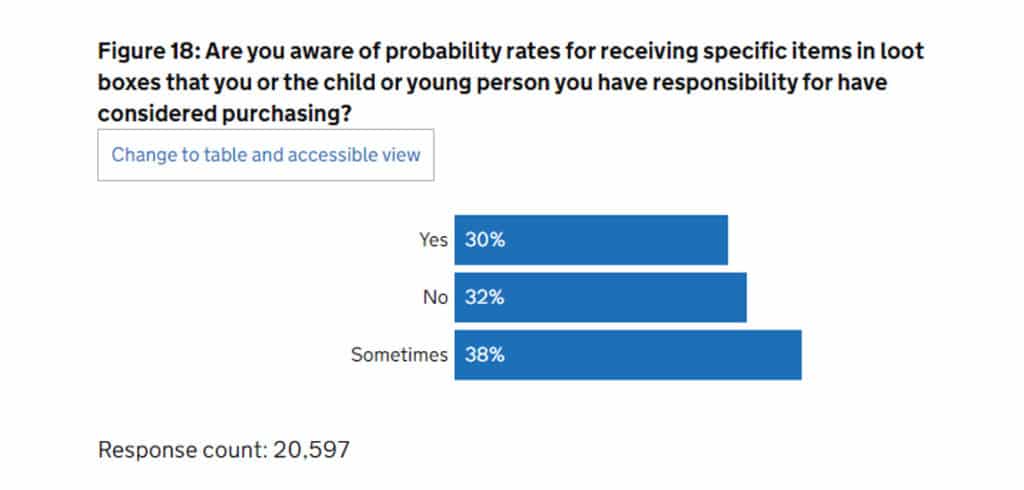The UK Government has announced it is not banning the sale of in-game loot boxes to children in the UK, or planning to amend gambling regulation to cover loot boxes, following a lengthy investigation.
But it did give the games industry a warning, saying it must do better to ‘improve protections for children, young people and all consumers’, and that if this doesn’t happen, it ‘will not hesitate to consider legislative change’.
The news comes two years after the UK Government called for deeper research into loot boxes, after the DCMS Select Committee’s initial report on Immersive and Addictive Technologies called on the Government to regulate loot boxes under the Gambling Act – and ban their sale to children.
Rt Hon Nadine Dorries MP, Secretary of State for Digital, Culture, Media and Sport, said in this loot boxes consultation outcome page on the Gov.uk website:
“As the evidence base on loot boxes is still emerging, and direct government intervention may risk unintended consequences, our view is that it would be premature to take legislative action without first pursuing enhanced industry-led measures to deliver protections for children and young people and all players.”
Nadine Dorries, DCMS
“As a result, the government does not intend to make changes to the Gambling Act or to other statutory consumer protections with regards to loot boxes at this time.
“We want to mobilise the industry’s creativity, innovation and technical expertise to deliver tangible progress, improving at pace protections for children and young people and all consumers. If this does not happen, we will not hesitate to consider legislative change.”
The Government said: “Purchases of loot boxes should be unavailable to all children and young people unless and until they are enabled by a parent or guardian. We welcome the commitment from Ukie to explore practical ways of achieving this objective, and call on the wider games industry to ensure that active and informed parental choice supports how children and young people engage with video games.”
However, on an Esports News UK stream this evening, X7 founder Josh ‘Hyrav’ Kingett said: “It’ll be near-impossible to enforce an age-lock on access – I think that’ll only backfire on publishers.”
ENUK stream viewer UncleMerk added: “If they did put on an age lock, how would they manage it to prevent children from just doing the simple thing of changing the year they were born on registration?”
There are tech providers out there like Yoti, an identity platform that says it has ‘accurate age estimation technology providing a secure way of proving ages, without revealing any personal information or any need for ID documents’, with no need for ID documents, and images that are deleted after the age check. British Esports has explored working with Yoyi, with the Yoti app letting people prove their age with one tap, verified with a government ID and facial biometrics. Whether this kind of tech will be implemented in games with loot boxes in the future, remains to be seen.
The report added that legislation to introduce an outright ban on children purchasing loot boxes “could have the unintended effect of more children using adult accounts, and thus having more limited parental oversight of their play and spending”.
Dorries also spoke of the UK’s ‘world-class video games industry, its contribution to the UK’s cultural landscape and creative economy’ and how the UK games sector contributed £2.9bn to the UK economy in 2019. She also noted that the regulatory landscape in the UK is continuing to evolve to protect children and consumers, through the introduction of the Online Safety Bill and the Age Appropriate Design Code.

The government said a new technical working group, convened by DCMS, will be established, as will a new Video Games Research Framework ‘to develop better evidence on the impacts, positive and negative, of loot boxes and video games more broadly’. The framework is expected to launch before the end of 2022.
The working group will include representatives of games publishers and platforms and government departments and regulatory bodies. It will engage with academics, consumer and third sector groups, ‘to ensure that solutions are workable for parents, children and young people and all players’.
Some would argue around three years, 32,000 responses to a player survey (99% of whom said they’re gamers), 50 direct submissions and an independent review of academic studies is more than enough to have already developed a good level of evidence in this area, and there are many accounts of gamers’ experiences with loot boxes that have been passed to government. Some young people have reported spending thousands of pounds of their or their families’ money, after becoming addicted to the ‘gambling-like’ element of loot boxes.
Currently, the UK and other European countries display PEGI age ratings on boxed games, and one content descriptor and image is the ‘in-game purchases’ warning, which lets a buyer know if a game has additional in-game paid-for microtransactions, like packs in FIFA Ultimate Team, for example.
Association between loot boxes and harms found, with greater possible harms to young people, but ‘no causative link’ found

In a separate government press release, titled, ‘Companies must do more to ensure safe and responsible gaming and take action on ‘loot boxes’ to protect young people’, the government admitted that ‘players who have purchased loot boxes may be more likely to experience gambling, mental health, financial and problem gaming-related harms, and that the risk may also be higher for children and young people’.
But while there an association between loot boxes and harms, the government said there is ‘no causative link’.
“The call for evidence has strengthened considerably our understanding of this complex issue,” Dorries continued. “But it has also demonstrated the challenges and limitations in the available research. The call for evidence has found an association between loot boxes and harms, but we have not found whether there is a causative link.
“Our view is that children and young people should not be able to purchase loot boxes without parental approval. In addition, all players should have access to spending controls and transparent information to support their gaming.”
Nadine Dorries, DCMS
“We want to stop children going on spending sprees online without parental consent, spurred on by in-game purchases like loot-boxes. Games companies and platforms need to do more to ensure that controls and age-restrictions are applied so that players are protected from the risk of gambling harms. Children should be free to enjoy gaming safely, whilst giving parents and guardians the peace of mind they need.”
The report added: “The call for evidence has shown that loot box purchases may be linked to a variety of harms. In particular, there is robust evidence of an association with problem gambling. However, research has not established whether a causal relationship exists between loot box purchases and problem gambling and there are a range of plausible explanations that could underpin this association.
“The evidence we received also convincingly highlighted children and young people’s inherent vulnerabilities that may increase their risk of experiencing harms from loot boxes – such as less developed impulse control, susceptibility to peer pressure, and a generally more limited understanding of purchasing decisions and probabilities.”
In September 2021, the CAP published new guidance on in-game purchases.
UK games industry trade bodies weigh in on loot boxes, with TIGA saying children and vulnerable adults need to be protected
Reacting to the news, Dr Jo Twist OBE, CEO at Ukie, said: “As a responsible industry, we have committed to exploring additional ways to support players and parents to build on our existing work developing and raising awareness of parental controls. We look forward to engaging closely with the Government and other organisations in the working group and on the Video Games Research Framework.”
Ukie has also committed to raise awareness of spending controls and to promote safe and responsible play for players of all ages. Ukie says it has also committed to support vulnerable adults, including through working with organisations such as the Money Advice Service.
Dr Richard Wilson OBE, CEO at TIGA, added: “TIGA believes that games businesses should aim to ensure that games are safe to use for all players. In 2020, TIGA formally adopted its 5 Principles for Safeguarding Players, designed to embody the spirit of the approach that games companies should adopt in operating their businesses within the UK.
“Children and young people should not be able to buy ‘loot boxes’ in video games without parental consent. TIGA also believes that vulnerable adults need to be protected against potential harms arising from loot boxes. TIGA looks forward to contributing to the DCMS’s planned working group to advance measures to protect players from potential harms.”
What do other authorities think of loot boxes?

In 2018, Belgium declared loot boxes illegal. In January 2019, EA stopped selling FIFA Points in Belgium following government pressure over loot boxes, saying loot boxes are ‘just surprise mechanics’.
The Netherlands Gambling Authority had previously also declared loot boxes illegal because they are considered a game of chance, and therefore violate the country’s Gambling Act. The Dutch authorities ended up issuing EA with a fine of up to €10m over loot boxes in FIFA, however this was later overturned.
In Spain, the Ministry of Consumer Affairs has also recently committed to introducing legislation to restrict the sale of loot boxes in the country.
Consumer groups in 18 European countries backed a report calling gaming loot boxes “exploitative”. And independent gambling harm consultancy Epic Risk Management called on UK authorities to ban the sale of video game ‘loot box’ products to people under 18.
18 takeaways from the Government’s full report on loot boxes
- At the end of 2019, the loot box market in the UK was projected to be worth £700 million, while the UK market for video game software sales was estimated to be £3.85bn that year, meaning loot boxes make up almost 20% of game revenues in the UK
- The InGame rapid evidence assessment found 15 peer reviewed empirical studies that identified a stable and consistent association between loot box use and problem gambling. There is also emerging evidence of a dose-response relationship, where greater loot box spending is related to greater problem gambling severity
- 62% of adult respondents (aged 16+) to the player survey responded to the question regarding positive experiences with loot boxes. Examples of positive experiences included receiving a rare or valuable item, obtaining rewards that progress gameplay conditions, and enhancing gameplay experience and enjoyment

- 63% of adult respondents to the player survey reported negative experiences with loot boxes. Negative experiences ranged from general dissatisfaction to reporting that loot boxes cause or contributed towards financial, gambling-related and/or mental health harms. They included contentions that loot boxes: are expensive, encourage unsatisfactory purchases, or are not value for money, come with hidden costs, and were mis-sold, lacked information or players experienced pressure to purchase.
- Respondents highlighted that children generally have less developed impulse control, greater susceptibility to peer pressure, and a more limited understanding of purchasing decisions and probabilities.
“A few respondents said that children and young people have a limited understanding of how the loot box random reward mechanism works compared to adults, and therefore do not have an adequate understanding of information presented to them to make informed purchasing decisions.”
DCMS
- A Juniper Research report of 2021 estimates that revenue generated by loot boxes, not including skins gambling, in video games will exceed $20bn by 2025, up from an estimated $15bn in 2020
- In the Government’s research, nearly all survey respondents (98%) had opened a loot box, with the majority of respondents opening a loot box in each of the following ways: opened a free loot box (86%), purchased a loot box directly with real-world money (63%), purchased a loot box with in-game currency such as coins or gems earned through gameplay (80%), and purchased a loot box with in-game currency such as coins or gems paid for with real-world money (72%)
- Some players said their engagement with loot boxes caused or contributed to stress, emotional distress, depression and anxiety.
- A 2021 study commissioned by Gamble Aware and conducted by the University of Plymouth and University of Wolverhampton found that, from their analysis of data from over 7,000 loot box purchasers, a third of the 5% of players that spent more than £70 per month on loot boxes fell into the PGSI problem gambler category.
- A 2022 academic study found self-reported evidence of gateway effects, including loot boxes influencing gambling and the reverse. “This study used a cross-sectional approach, asking participants about the impact of loot boxes retrospectively, and so does not necessarily provide evidence of causality,” the Government said
- One study considered by InGame found that the top 5% of loot box spenders generated half of the total expenditure on loot boxes

- Several respondents said that loot boxes exploited children’s naivety and inexperience, including through perceived ‘coercive’ or ‘aggressive’ monetisation strategies, and behavioural nudges, such as time-limited promotions.
- ‘Pity timers’ change the probabilities of obtaining items from loot boxes as players make more purchases. It was argued that not providing appropriate notice to the player of the use of pity timers, and how such mechanics and player data are used to change probabilities (both beneficial and detrimental) may be a misleading action or a misleading omission
- A few respondents said that children and young people have a limited understanding of how the loot box random reward mechanism works compared to adults, and therefore do not have an adequate understanding of information presented to them to make informed purchasing decisions
- Some players said that their loot box purchasing sometimes felt out of control as a consequence of different motivating factors, and experienced difficulties in monitoring or managing their spend
- Some players said that their loot box use had led to them engaging with traditional gambling products, such as online slots
- Other players stated their engagement with loot boxes had a harmful impact on their mental health
- A number of respondents commented on witnessing severe behavioural and emotional reactions after restricting access to loot box purchases for children and young people or when funds had been exhausted. These included examples of low moods, frustration, and agitation

Are loot boxes gambling? Government explains why they think they’re not
“While many loot boxes share some similarities with traditional gambling products, we view the ability to legitimately cash out rewards as an important distinction,” the Government says in the report. “In particular, the prize does not normally have real world monetary value outside of the game, and its primary utility is to enhance the in-game experience. The Gambling Commission has shown that it can and will take action where the trading of items obtained from loot boxes does amount to unlicensed gambling, and it will continue to take robust enforcement action where needed.”
The Government says that potentially changing the Gambling Act with regards to loot boxes would be costly and a challenge to implement, ‘with risks of unintended consequences’.
“Our expectation is that if loot boxes were brought within the scope of gambling regulation, many publishers would simply redevelop their games or cease offering them in Great Britain, rather than applying for and maintaining Gambling Commission Licences for the company and key staff. While some stakeholders may see this or even an outright ban as a good outcome, it would not negate the need for the Gambling Commission and HMRC to develop and maintain procedures to handle loot boxes. This would raise questions over whether the costs associated provide good value for money for taxpayers, especially when outcomes to mitigate the risk of harm for children, young people and adults may be achieved through different and less costly means.”
DCMS
“After careful consideration, the government does not intend to amend or extend the scope of gambling regulation to cover loot boxes at this time. In doing so, we have considered regulating loot boxes as gambling as one means of achieving some of our objectives to mitigate the risk of harms for children, young people and adults, and have concluded that it would come with significant limitations which make other policy solutions to achieve the same ends preferable,” it added.
“Whilst many loot boxes share some similarities with traditional gambling products, we view the ability to legitimately “cash out” rewards as an important distinction. This is not to say that some loot box deployments may not meet the existing definition (it is ultimately for the Gambling Commission and/or courts to decide), but on the basis of the evidence considered our view is that the user experience of most loot boxes is materially different from gambling. In particular, the prize does not normally have real-world monetary value outside of the game, and its primary utility is to enhance the in-game experience.”
The government’s response to the call for evidence on loot boxes has been developed alongside its review of the 2005 Gambling Act. The Government says a white paper setting out the conclusions from the review and vision for the gambling sector will be published as soon as possible.
Esports News UK editor Dom Sacco dived into the UK Government loot boxes topic in more detail in this stream video.

Dom is an award-winning writer and finalist of the Esports Journalist of the Year 2023 award. He graduated from Bournemouth University with a 2:1 degree in Multi-Media Journalism in 2007.
As a long-time gamer having first picked up the NES controller in the late ’80s, he has written for a range of publications including GamesTM, Nintendo Official Magazine, industry publication MCV and others. He worked as head of content for the British Esports Federation up until February 2021, when he stepped back to work full-time on Esports News UK and offer esports consultancy and freelance services. Note: Dom still produces the British Esports newsletter on a freelance basis, so our coverage of British Esports is always kept simple – usually just covering the occasional press release – because of this conflict of interest.



